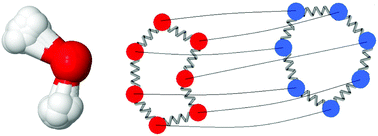Using a monomer potential energy surface to perform approximate path integral molecular dynamics simulation of ab initio water at near-zero added cost
Abstract
It is now established that nuclear quantum motion plays an important role in determining water's hydrogen bonding, structure, and dynamics. Such effects are important to include in density functional theory (DFT) based molecular dynamics simulation of water. The standard way of treating nuclear quantum effects, path integral molecular dynamics (PIMD), multiplies the number of energy/force calculations by the number of beads required. In this work we introduce a method whereby PIMD can be incorporated into a DFT simulation with little extra cost and little loss in accuracy. The method is based on the many body expansion of the energy and has the benefit of including a monomer level correction to the DFT energy. Our method calculates intramolecular forces using the highly accurate monomer potential energy surface developed by Partridge–Schwenke, which is cheap to evaluate. Intermolecular forces and energies are calculated with DFT only once per timestep using the centroid positions. We show how our method may be used in conjunction with a multiple time step algorithm for an additional speedup and how it relates to ring polymer contraction and other schemes that have been introduced recently to speed up PIMD simulations. We show that our method, which we call “monomer PIMD”, correctly captures changes in the structure of water found in a full PIMD simulation but at much lower computational cost.



 Please wait while we load your content...
Please wait while we load your content...